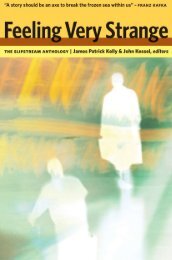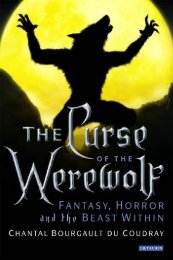- Page 1: a long way from Home
- Page 5 and 6: a long way from Home Claude McKay e
- Page 7: contents Acknowledgments ix Chronol
- Page 11 and 12: chronology 1889 Festus Claudius McK
- Page 13 and 14: chronology • xiii 1924 Completes
- Page 15: chronology • xv impoverished and
- Page 18 and 19: xviii • introduction decade of hi
- Page 20 and 21: xx • introduction Jamaica because
- Page 22 and 23: xxii • introduction literature se
- Page 24 and 25: xxiv • introduction symptomatic o
- Page 28 and 29: xxviii • introduction an official
- Page 30 and 31: xxx • introduction Americans to T
- Page 32 and 33: xxxii • introduction aesthetics o
- Page 34 and 35: xxxiv • introduction Flawed think
- Page 36 and 37: xxxvi • introduction at the unive
- Page 39: a note on the text The following is
- Page 43: To my friends everywhere
- Page 46 and 47: 6 • contents 23 Frank Harris in F
- Page 49 and 50: chapter 1 A Great Editor That run w
- Page 51 and 52: a great editor • 11 Coaches and d
- Page 53 and 54: a great editor • 13 beauty spots
- Page 55 and 56: a great editor • 15 real Rhine wi
- Page 57 and 58: a great editor • 17 I related to
- Page 59 and 60: a great editor • 19 Fabians. Was
- Page 61 and 62: a great editor • 21 that for a lo
- Page 63 and 64: a great editor • 23 made one sple
- Page 65 and 66: a great editor • 25 my point, but
- Page 67 and 68: other editors • 27 tell that the
- Page 69 and 70: other editors • 29 that. And I re
- Page 71 and 72: other editors • 31 Liberator be d
- Page 73 and 74: chapter 3 White Friends The phrase
- Page 75 and 76: white friends • 35 did not think
- Page 77 and 78:
white friends • 37 that I would l
- Page 79 and 80:
white friends • 39 bing his hands
- Page 81 and 82:
another white friend • 41 When I
- Page 83 and 84:
another white friend • 43 go into
- Page 85 and 86:
another white friend • 45 we were
- Page 87 and 88:
another white friend • 47 He neve
- Page 89:
part two English Inning
- Page 92 and 93:
52 • a long way from home In that
- Page 94 and 95:
54 • a long way from home And Sha
- Page 96 and 97:
chapter 6 Pugilist vs. Poet Had I b
- Page 98 and 99:
58 • a long way from home persons
- Page 100 and 101:
60 • a long way from home wet. Th
- Page 102 and 103:
62 • a long way from home Feastin
- Page 104 and 105:
64 • a long way from home The ass
- Page 106 and 107:
66 • a long way from home the sec
- Page 108 and 109:
68 • a long way from home Pankhur
- Page 110 and 111:
70 • a long way from home the cos
- Page 112 and 113:
72 • a long way from home (I thin
- Page 114 and 115:
74 • a long way from home troubad
- Page 117:
part three New York Horizon
- Page 120 and 121:
80 • a long way from home close r
- Page 122 and 123:
82 • a long way from home The exc
- Page 124 and 125:
84 • a long way from home remembe
- Page 126 and 127:
One day she entertained me by readi
- Page 128 and 129:
88 • a long way from home angel
- Page 130 and 131:
90 • a long way from home It was
- Page 132 and 133:
92 • a long way from home there b
- Page 134 and 135:
chapter 10 A Brown Dove Cooing The
- Page 136 and 137:
96 • a long way from home and I s
- Page 138 and 139:
chapter 11 A Look at H. G. Wells Wh
- Page 140 and 141:
100 • a long way from home citize
- Page 142 and 143:
102 • a long way from home and ge
- Page 144 and 145:
chapter 12 “He Who Gets Slapped
- Page 146 and 147:
106 • a long way from home eager
- Page 148 and 149:
It was at this time that I wrote a
- Page 150 and 151:
110 • a long way from home disapp
- Page 152 and 153:
112 • a long way from home Someon
- Page 154 and 155:
114 • a long way from home determ
- Page 156 and 157:
chapter 13 “Harlem Shadows” Mea
- Page 158 and 159:
118 • a long way from home antici
- Page 161 and 162:
chapter 14 The Dominant Urge Iwent
- Page 163 and 164:
the dominant urge • 123 group, wh
- Page 165 and 166:
the dominant urge • 125 Of amorou
- Page 167 and 168:
the dominant urge • 127 ine that
- Page 169 and 170:
the dominant urge • 129 and said:
- Page 171 and 172:
chapter 15 An Individual Triumph Me
- Page 173 and 174:
an individual triumph • 133 Chorn
- Page 175 and 176:
chapter 16 The Pride and Pomp of Pr
- Page 177 and 178:
the pride and pomp of proletarian p
- Page 179 and 180:
the pride and pomp of proletarian p
- Page 181 and 182:
the pride and pomp of proletarian p
- Page 183 and 184:
the pride and pomp of proletarian p
- Page 185 and 186:
literary interest • 145 I met som
- Page 187 and 188:
literary interest • 147 crusader
- Page 189 and 190:
chapter 18 Social Interest My const
- Page 191 and 192:
social interest • 151 know if the
- Page 193 and 194:
social interest • 153 “I guess
- Page 195 and 196:
social interest • 155 It was nece
- Page 197 and 198:
social interest • 157 us forever!
- Page 199 and 200:
chapter 19 A Great Celebration Of a
- Page 201 and 202:
a great celebration • 161 remembe
- Page 203 and 204:
a great celebration • 163 impress
- Page 205 and 206:
a great celebration • 165 but I w
- Page 207 and 208:
a great celebration • 167 up for
- Page 209 and 210:
a great celebration • 169 really
- Page 211 and 212:
a great celebration • 171 of the
- Page 213 and 214:
a great celebration • 173 Has van
- Page 215 and 216:
egarding radical criticism • 175
- Page 217 and 218:
egarding radical criticism • 177
- Page 219 and 220:
egarding radical criticism • 179
- Page 221:
part five The Cynical Continent
- Page 224 and 225:
184 • a long way from home Specul
- Page 226 and 227:
186 • a long way from home to the
- Page 228 and 229:
188 • a long way from home There
- Page 230 and 231:
190 • a long way from home My Eng
- Page 232 and 233:
192 • a long way from home in Mon
- Page 234 and 235:
194 • a long way from home work,
- Page 236 and 237:
196 • a long way from home writin
- Page 238 and 239:
198 • a long way from home mix wi
- Page 240 and 241:
200 • a long way from home My fri
- Page 242 and 243:
202 • a long way from home seen s
- Page 244 and 245:
chapter 23 Frank Harris in France L
- Page 246 and 247:
206 • a long way from home wore a
- Page 248 and 249:
208 • a long way from home Negro
- Page 250 and 251:
210 • a long way from home Said t
- Page 252 and 253:
212 • a long way from home be a k
- Page 254 and 255:
214 • a long way from home at and
- Page 256 and 257:
216 • a long way from home At tha
- Page 258 and 259:
218 • a long way from home Le Cor
- Page 260 and 261:
220 • a long way from home “Yes
- Page 262 and 263:
222 • a long way from home I went
- Page 265:
part six The Idylls of Africa
- Page 268 and 269:
228 • a long way from home the be
- Page 270 and 271:
230 • a long way from home I was
- Page 272 and 273:
232 • a long way from home thing
- Page 274 and 275:
234 • a long way from home When I
- Page 276 and 277:
the milieu of railroad men, from wh
- Page 278 and 279:
She embarrassed me by continually s
- Page 280 and 281:
240 • a long way from home reprod
- Page 282 and 283:
242 • a long way from home tipsy
- Page 284 and 285:
244 • a long way from home I was
- Page 286 and 287:
246 • a long way from home Mr. Va
- Page 288 and 289:
chapter 28 Hail and Farewell to Mor
- Page 290 and 291:
250 • a long way from home 2 Oh a
- Page 292 and 293:
252 • a long way from home thousa
- Page 294 and 295:
254 • a long way from home nonplu
- Page 296 and 297:
256 • a long way from home Stein
- Page 298 and 299:
258 • a long way from home and Ev
- Page 300 and 301:
260 • a long way from home You ma
- Page 302 and 303:
262 • a long way from home Nevert
- Page 304 and 305:
that Fannie Hurst desires to promot
- Page 306 and 307:
266 • a long way from home someth
- Page 308 and 309:
268 • a long way from home Negro
- Page 310 and 311:
270 • a long way from home the Ne





